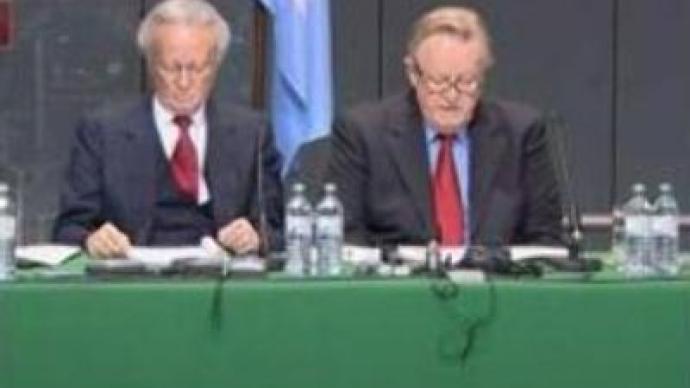Final talks on UN plan for Kosovo end in deadlock

In Vienna, Austria, top Serbian and Albanian leaders have failed to agree on a UN plan for the disputed province of Kosovo. The UN special envoy, Martti Ahtisaari, said the parties of the talks had failed to find common ground.
The UN Envoy said he will submit a plan for the province to the UN Security Council later this month.The United Nations blueprint for Kosovo set out the framework for an independent state, under a foreign overseer, the European Union police mission, and the NATO peace force.It also offered self-government and protection for the Serb minority.Finally, the UN proposal was endorsed by ethnic Albanian leaders, but vehemently rejected by Serbian officials. They argue it will lead to Kosovo's independence, and will have the most destructive effect on the Balkan region.At the closing press conference, Martti Ahtisaari underlined the efforts put into the Kosovo issue by the UN, and stressed the importance of finding a solution to the matter.“It is my firm conclusion that the potential of negotiations is exhausted. At the same time, a sustainable solution to the problem of Kosovo status is urgently needed,” emphasised Mr Ahtisaari.Prior to the talks, the President of Kosovo, Fatmir Sejdiu, made a short statement saying it was a very important day. He stated that their delegation had come to Vienna to present their point of view and to work on Kosovo becoming a democratic country, integrated into the international community as an independent state.“We are here to put an end to these talks. We need to move forward so it can enable us and our country to move to a democratic country and to integrate our country into the European Union. And of course our determination will always be an independent Kosovo,” said Mr Sejdiu.A six-nation contact group consisting of Russia, the United States, Italy, France, Germany and Britain had been guiding the Kosovo negotiations. The U.S. and European Union endorsed Martti Ahtisaari's plan, but Russia continued to insist that the status proposal must be acceptable to both Kosovo and Serbia.A political analyst from the Institute of Slavonic and Balkan Studies, Aleksander Karasyov explained the reasons behind Serbian leaders’ refusal to accept the U.N. proposal.“This is a blow to Serbs, to their identity, to their pride, to their self-comprehension. Besides, this [process of this territory becoming independent] is a sort of threat, as this precedent would promote the development of separatists’ movements in Serbia itself as well as in the Balkan region as a whole. Serbs believe such a decision would be a threat not only to them, but to their neighbours, as well. So, they believe that Kosovo might get a broad autonomy, but not independence,” stressed Mr Karasyov.Meanwhile, there are fears among peacekeepers in Kosovo that further delays to the decision on the status of the Kosovo province might lead to outbreaks of violence, similiar to what happened in Pristina, the capital of the region, last month when Mr Ahtisaari presented his plan.
You can share this story on social media:












